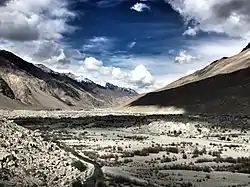Chapursan
Chapursan (Wakhi: چپورسن; also spelt Chipurson, Chipurson, Chaporsan, Chupurson) is a valley containing some eight scattered villages within the Hunza District of Gilgit-Baltistan, Pakistan. It is the most Northern part of Pakistan, bordering Afghanistan and China. Majority of the people in the valley speak the Wakhi Language, but the villagers of Raminj town speak Burushaski language and belong to the Ismaili sect of Islam. Chipurson Valley hosts over 500 households with 3000 population.
Chapursan
چپورسن Che'pursan | |
|---|---|
 | |
 Chapursan  Chapursan | |
| Coordinates: 36°44′N 74°44′E | |
| Country | Pakistan |
| Territory | Gilgit-Baltistan |
| Division | Gilgit |
| District | Hunza |
| Tehsil | Gojal |
| Population | |
| • Total | 3,000 |
Geography
The Chipurson valley is above 3000 meter from sea level and the villages are Yarzerech, Raminj, Kirmin (Noorabad, Rahimabad & aminabad), Kil (Khill), Reshit, Shehr-e-subz, Ispenj, Shitmerg and ZuwudKhoon (also spelt Zood Khun ,Zoodkhun. Khudayarabad).
After Zood Khun pastures are Yashkuk, Kukchaizem, Biban Joi, Koorban, Korkot, Joi Sam, Dainkut, Khudayar Alga, Kimkut, Aston ( Baba Ghundhi ). Yashwoshitk, Shipodkut, Pomiri( Pamiri ), Pamir and more.
All the name of village and Pastures are in Wakhi language.
The valley is full of peaks and passes. Passes include Irshad Pass between Pakistan and Afghanistan and Lupghar Pir Pass between Yeshkuk and Raminj village. Peaks include Sakar Sar, Kumpire Dior, Pumir Sar, Sarmaya Sar, Kuksar, and Lupghar Sar.
Sites of interest
Chapursan Valley has historical places like Yaskuk, Rovai Sam, Khumpir Dior, and Shrine of Baba Ghundi.
Shrine of Baba Ghundi (Baba Ghundi Ziarat) in the Chuparsan Valley is the shrine of the famous Pir of Ghund who is celebrated in legend as the Sufi saint who brought Islam to the valley.[1] The saint is not actually buried here. The former Mir of Hunza kept his herds of sheep and goats for grazing around here and used to visit the shrine every year. The people of Hunza Valley also revere the saint and it is said that children who are a problem for their parents have only to taste the mud from a stream near Baba Ghundi after which they become obedient and well behaved.
References
- Nagri, Jamil (October 3, 2015). "Hunza's Baba Ghundi Festival concludes". DAWN. Retrieved 16 December 2019.
The festival was held at the shrine of Baba Ghundi to pay homage to the Sufi saint for his pioneering role in the spread of Islam in the region.
| Wikimedia Commons has media related to Chapursan Valley. |